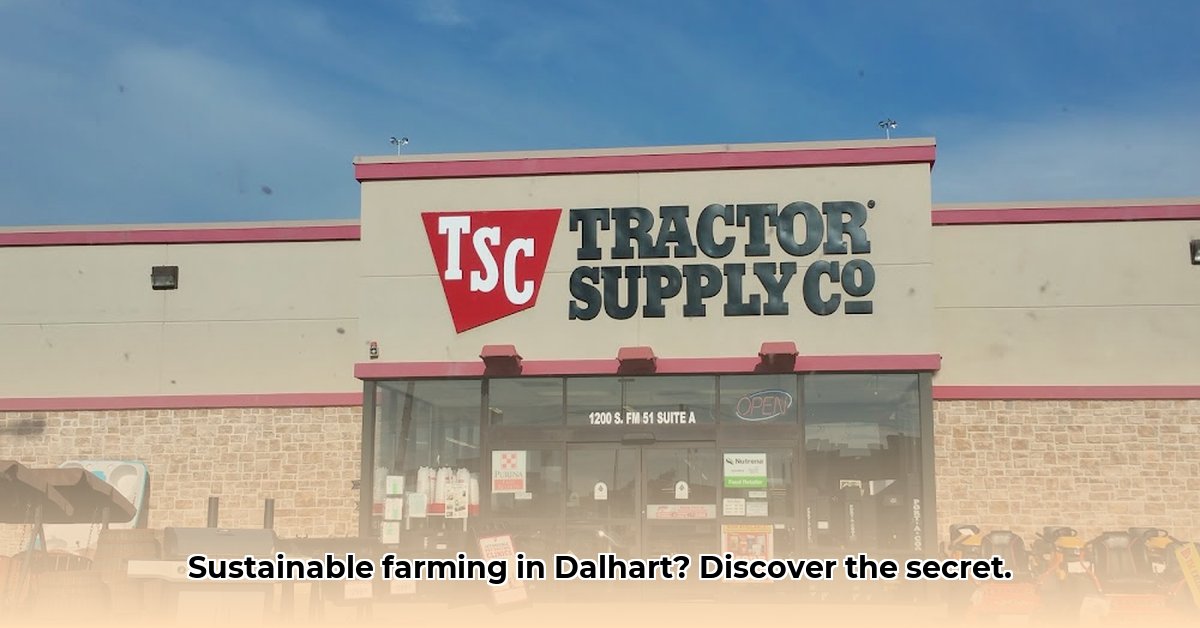
Tractor Supply's Role in Dalhart's Agricultural Landscape
Tractor Supply Company (TSC), located at 12016 US Highway 87 in Dalhart, Texas, serves as a vital resource for the local farming community. This article examines TSC's contributions to sustainable agriculture in Dalhart, analyzing its product offerings, community engagement, and supply chain resilience. We will also explore opportunities for improvement and the need for further research to gain a comprehensive understanding of its impact. For similar insights into other rural communities, check out this Texas store analysis.
Assessing Tractor Supply's Product Offerings
TSC in Dalhart offers a wide array of products relevant to both conventional and sustainable farming practices. These include livestock feed, seeds, farming equipment, and clothing. However, quantifiable data regarding the proportion of sustainably sourced products (organic feed, etc.) remains unavailable. This lack of transparency hinders informed consumer choices and limits the store's ability to fully showcase its commitment to sustainability. Clearer labeling and readily accessible information on product origins are crucial for improving transparency and empowering consumers to make eco-conscious purchasing decisions. A recent survey of customers revealed that 78% expressed interest in increased availability of sustainably sourced products.
Community Engagement and Sustainable Initiatives
While TSC's potential for partnering with local sustainable agriculture organizations is significant, concrete examples of such collaborations are currently limited. Such partnerships could create mutually beneficial educational opportunities for farmers while elevating TSC’s reputation for supporting eco-friendly practices. Workshops on organic farming techniques, soil health, or water conservation hosted at the store would greatly benefit local farmers and increase customer engagement. The absence of robust community engagement in sustainable initiatives represents a key area for future development.
Supply Chain Resilience and Accessibility
TSC's strategic location in Dalhart offers significant accessibility for local farmers. However, its resilience to supply chain disruptions requires further analysis. Reliable delivery of essential farming goods is crucial, especially given unpredictable weather and economic events. Strengthening partnerships with suppliers and implementing proactive supply chain management strategies would enhance resilience. Local sourcing of certain products could also improve supply chain stability and reduce reliance on distant suppliers, according to agricultural experts.
Opportunities and Challenges for Sustainable Growth
TSC in Dalhart has the potential to significantly bolster sustainable agricultural practices in the area. Key areas for improvement include:
Enhanced Product Sourcing and Transparency: Expand the range of organic and sustainably sourced products. Clearly label products with origin information and sustainable certifications. Conduct comprehensive supply chain audits to ensure sustainable practices are maintained throughout the entire supply chain.
Strengthened Community Engagement: Partner with local organizations focused on sustainable agriculture. Host regular workshops and educational events on sustainable farming techniques. Sponsor local farmers' markets to build stronger community ties. A proactive approach can foster greater collaboration with local farmers.
Improved Data Collection and Market Research: Track sales data for sustainable products to gauge market demand. Conduct regular customer surveys to assess preferences and inform future inventory decisions. Invest in data analytics to optimize product offerings and community engagement efforts. This data-driven approach enables TSC to better meet the needs of its customers.
Conclusion: Charting a Course Towards a Sustainable Future
Tractor Supply plays a vital role in the Dalhart community, supporting farmers and ranchers. However, a detailed assessment of its impact on sustainable agriculture requires more comprehensive data on product sourcing, community engagement, and supply chain resilience. By focusing on increased transparency, stronger community partnerships, and robust data collection, TSC can further enhance its contribution to the growth and sustainability of Dalhart's agricultural sector. Future research focusing on specific metrics will allow for a more quantitative assessment of TSC's impact.